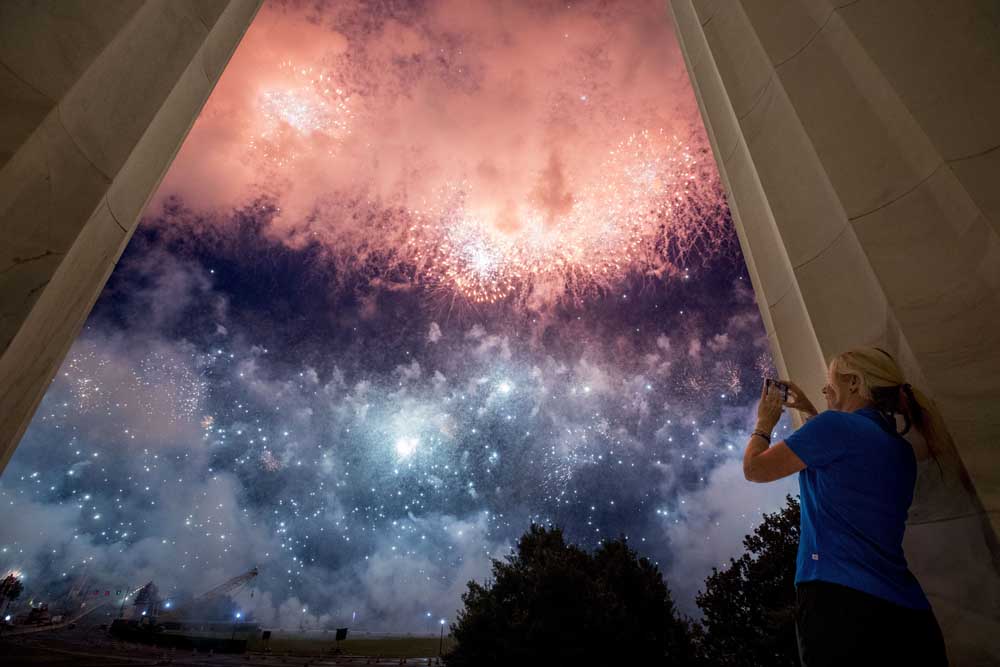Our View: On the Fourth of July, celebrate and reflect
Published 12:30 am Saturday, July 4, 2020

- Fireworks from the Lincoln Memorial explode over the Potomac River in Washington, D.C., in 2019.
“We hold these truths to be self-evident: That all men are created equal; and they are endowed by their creator with certain inalienable rights; that among these are life, liberty and the pursuit of happiness.”
Trending
On the Fourth of July, it is appropriate to reflect on the reasons for the holiday and to pause and take a critical look at the republic.
The coronavirus pandemic means that the manner in which we celebrate our remarkable freedoms will be different. There will be no official fireworks displays locally. While gatherings should be discouraged, those that take place should be small, heeding scientists’ warnings on personal face protection requirements and social distancing.
Nevertheless, the landmark date is still an opportunity to reflect on the overthrow of tyrannical power from our “absentee landlord” and the creation of our noble experiment with, as its centerpiece, a form of government specifically designed with checks and balances on power to curtail potential abuses.
Trending
It’s often said that the Declaration of Independence is one of the most remarkable documents ever penned in the English language. In part this is because it lists the grievances against King George III in such specific detail — “a history of repeated injuries and usurpations” — while highlighting the “patient sufferance of these colonies.”
It declares that change should not be made lightly, but maintains that July 4, 1776, is time to do so.
What has changed in our American society since then?
We would argue nothing. That trio of inalienable rights — “life, liberty and the pursuit of happiness” — remains just as important as a goal for today’s technologically connected Americans as it did for those brave colonists priming their muskets almost two-and-a-half centuries ago.
Including the “pursuit of happiness” was such a memorable concept that years later Japan, South Korea and some South American nations would incorporate it in their new constitutions.
It is remarkable in its simplicity and its sincerity. We should all cherish its humanity.
And what of the republic? Will it endure the troubles of 2020?
We believe it will, in large part because enlightened Americans appreciate that the features highlighted in the declaration, later enshrined in the Constitution and Bill of Rights, signal a journey rather than a destination.
The trio of ills that have plagued the history of our continent, religious intolerance, the genocide of our Native American population and the stain of slavery, should always form the backdrop to any reflections about progress. To ignore or downplay them is disingenuous.
In 2020, we still face many troubling challenges in these core areas.
Some religious groups claim supremacy over others, and seek to have their doctrine enshrined in laws or displayed in public buildings. This must be resisted with vigor; anyone who has studied world history knows that a wall of separation between church and state is essential for harmony.
The treatment of the Native American community continues to cause concern. The pandemic has revealed an upsetting disparity in their access to reliable health care. And the manner in which commercial interests have continued to desecrate Native lands is a national embarrassment.
Race continues to be a core focus; it must stay at the forefront of awareness until every shred of racism is eradicated from our great melting pot. The recent scrutiny of systemic racism in many of our nation’s police departments is the tip of the iceberg. Controversy over statues and Confederate flags, while important, actually distracts us from a wicked truth: too many otherwise reasonable Americans believe white people are superior.
That was evil in 1860 and 1964; that cannot be tolerated in 2020.
In all these discussions, we are drawn to the words of the declaration, published 244 years ago today.
“Experience hath shown that mankind are more disposed to suffer, while evils are sufferable, than to right themselves by abolishing the forms to which they are accustomed.”
The number of people taking to the streets — despite serious health risks from the pandemic — should send a clear signal to the nation that good people are intent on abolishing these forms. As the declaration states, it is both our right and our duty.
As we reflect on the state of the union, we prefer to seize upon a common hope for a united nation. It must happen; it should happen; it will happen.
It is stating the obvious that today our country is as polarized as sharply as it was in 1860 and again in the 1960s. But in each case, the republic endured, in large part because the overwhelming forces of good in our national character overcame the forces of hate and division.









